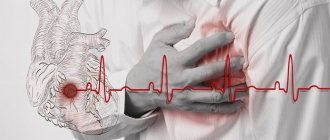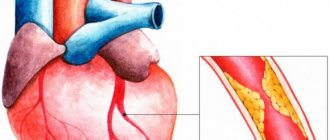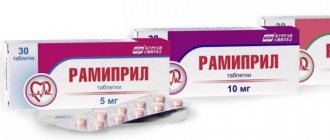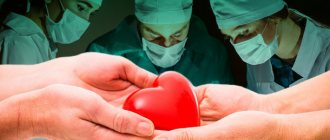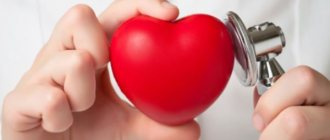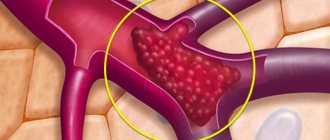Heart pain is one of the most common reasons people seek emergency care. Pain in the heart area is not always pain in the heart. Often it is not associated with heart problems. However, if you are experiencing chest pain and are not aware of the state of your cardiovascular system, the problem may be serious and it is worth taking the time to find out the cause of the pain.
Causes
Pain in the heart area has many causes; they can be divided into 2 large categories - “cardiac” and “non-cardiac”.
"Heart" reasons
Myocardial infarction - a blood clot that blocks the movement of blood in the arteries of the heart can cause pressing, squeezing chest pain that lasts more than a few minutes. The pain can radiate to the back, neck, lower jaw, shoulders and arms (especially the left). Other symptoms may include shortness of breath, cold sweats, and nausea.
Angina pectoris.
Over the years, fatty plaques can form in the arteries of your heart, limiting the flow of blood to the heart muscle, especially during exercise. It is the restriction of blood flow through the arteries of the heart that causes attacks of chest pain - angina. Angina is often described by people as a feeling of tightness or tightness in the chest. It usually occurs during physical activity or stress. The pain usually lasts about a minute and goes away with rest.
Other cardiac causes.
This may be pericarditis - inflammation of the heart lining, the pain is most often acute, stabbing in nature. Much less commonly, the pain can be caused by a dissection of the aorta, the main artery in your body. The inner layer of this artery can separate under blood pressure and the result is sharp, sudden and severe pain in the chest. Aortic dissection can be the result of chest trauma or a complication of uncontrolled hypertension.
"Non-heart" reasons
Heartburn is the reflux of stomach contents into the esophagus, often accompanied by a sour taste and belching. Heartburn chest pain is usually associated with food intake and can last for hours. This symptom most often occurs when bending or lying down. Taking antacids relieves heartburn.
Panic attacks - manifested by attacks of unreasonable fear, combined with chest pain, rapid heartbeat, hyperventilation (rapid breathing) and profuse sweating. You may suffer from “panic attacks” - a unique form of dysfunction of the autonomic nervous system.
Tietze syndrome. Sometimes the cartilaginous parts of the ribs, especially the cartilage that attaches to the sternum, can become inflamed. Pain in this disease can occur suddenly and be quite intense, simulating an attack of angina. However, the location of pain may vary. With Tietze syndrome, pain may increase when pressure is placed on the sternum or ribs near the sternum. Pain during angina pectoris and myocardial infarction does not depend on this.
Osteochondrosis of the cervical and thoracic spine leads to so-called vertebrogenic cardialgia, which resembles angina pectoris. In this condition, there is intense and prolonged pain behind the sternum, in the left half of the chest. There may be irradiation into the arms and interscapular area. The pain increases or decreases with changes in body position, head turns, and arm movements.
Doctors will tell you: What do you dream about when there is a threat of heart attack, stroke and cancer?
Not so long ago, only fortune tellers dealt with dreams, but then psychotherapists took them into service. But now general practitioners have already paid attention to dreams as a diagnostic method. Of course, not the only one. But at the same time very informative.
At night our body is free from external impressions. Only busy with himself. It is at this time that he carries out a kind of “checking” of the organs: is everything in order, what problems are there? And if something is wrong with the organ, it sends alarming signals to the brain. Sometimes - long before the disease “officially” manifests itself. And the brain, whenever possible, tries to bring them to our attention. He can do this only through dreams.
Scientists from different countries have collected and analyzed the results of research: exactly how our subconscious is trying to point us to health problems at night. In particular, the Austrian professor, cardiologist and oneirologist (the science of dreams) Herbert Eichorn believes that dreams are markers of many diseases or conditions of the human body and send us a kind of SOS, but we just need to interpret these signals correctly.
Observing patients with complaints of heart pain, Eichhorn also examined their dreams, including those they had before the onset of the disease. And I became convinced that many patients who had suffered a stroke or heart attack or were at serious risk saw the same thing in their dreams. They dreamed that someone was catching up with them and stabbing them in the heart - with a knife, sword, stick, or shooting them in the heart with a gun. They often experienced an unaccountable fear of death and woke up in the middle of the night, sweating, full of anxiety or even horror. They were haunted by scenes of pursuit (a symptom of tachycardia), attacks by maniacs or monsters, terrible falls from a cliff or cliff directly onto stones or into a bottomless abyss. Sometimes they dreamed of their own death from suffocation, or a blow similar to a strong electric current. Or that a snake, a huge stone was placed on their chest, or they were covered with heavy earth.
Partner news
Patriarch Kirill believes prayers for mental illness are more effective than science NSN
It is with these stories that the brain tries to reach our consciousness and draw attention to heart problems. After all, at night he receives only nerve impulses from the organs, and he himself transforms them into understandable images, trying, according to the famous scientist Alan Hobson , to weave them into stories with the sole purpose: to comprehend and explain biochemical changes and chaotic impulses, to help us understand our health , desperately send us a signal.
So if you often dream about something like this, go to the doctor and check if everything is okay with you.
Please note that experts do not use the word “often” by chance. Every person has had nightmares at least once in their dreams. They can be caused by a variety of factors: stuffiness in the bedroom, stress at work, a conflict situation at home, even an uncomfortable position while sleeping. Bloody nightmares often accompany infectious diseases with high fever - flu, sore throat. And they are one-time in nature. IMPORTANT : you need to pay attention to dreams if they are repeated.
The main sign that your body is sending you an SOS is the consistency of your dreams. This applies to diseases of all organs. Therefore, if your sleep is disturbing, keep a diary and write down the dreams that frightened you. And if they come back, you should check your health.
Experts have calculated approximate scenarios that accompany various diseases. N.V. Kasatkin has been seriously engaged in this for a long time . He observed various patients for many years, collected a huge amount of practical evidence from patients, and on this basis compiled an approximate list of dreams that may indicate specific diseases.
Gastrointestinal tract : Dreams of spoiled raw meat, rotten fish, rotten vegetables or fruits, mountains of stinking food or something disgusting on the plate. You dream that you eat sand, earth, something inedible and tasteless, bitter or nauseating. Teeth loss, nasty salty taste in the mouth.
Liver, gall bladder : If there is stagnation of bile or disturbances in the functioning of these organs, you dream of dark red raw meat, the taste of blood or bitterness in the mouth. Fights, being stabbed in the side, exhausting hectic chases that make you angry. In a dream you are irritated, unhappy, angry.
Bladder, kidneys : Dreaming that you are in a scary dark place. You can't go out. You can't find the toilet. Women dream that they are pregnant and feel enormous heaviness.
Respiratory organs : If you have problems with the lungs, you dream of suffocation - in a tunnel, in a tight space, in a submarine, a spaceship, where the air runs out. You dream that you are drowning, getting stuck headlong in a sucking swamp. You find yourself in a thick sticky fog where you can’t breathe. Dreams are accompanied by intense fear.
Vessels, heart : General themes: fear of death, lightning strike, knife in the heart, tight, oppressive clothing.
Hypertension : Fragmentary, disturbing, mostly vivid dreams, often of natural disasters: hurricanes, tsunamis, earthquakes. War, you or your loved ones are buried under rubble, you are feverishly trying to escape, your heart is pounding. Heavy workload, tinnitus, sharp whistling sounds.
Hypotonia : Dreams are dim, blurry, confused. A person cannot raise his hand, take a step even under the threat of danger, he must run, but he is frozen in place and cannot move. You dream that all the blood is flowing out, and you can’t stop it, you are being killed, but you don’t have the strength to resist, apathy takes over.
Flu, ARVI : Dreaming of dirt, dirty laundry, swimming in a swamp. Ice water. Or, conversely, a fire, a too hot bath. Nightmares with maniacs, monsters, chases.
Skin diseases : I dream that insects are crawling on my body: spiders, flies, cockroaches. You drive them away, they don’t fly away. Larvae crawl under your skin...
Arthritis of the fingers : You want and cannot pick up something, hold an important thing in your hands: a book, a bag...
Oncology : Its manifestations are varied, but you may have the same dream with strong, dagger-like pain in the affected area. Or with severe damage to the entire body: that a person fell under a press that flattened him, under a mechanical saw that cut him into pieces. Wild animals bite into the body and tear it apart. Or, while driving, you crash your car straight into a wall.
Neuroses, stress: You find yourself naked among a crowd of people. You can't pass the exam. You are late for a train or plane. You are in a foreign city and can’t figure out where to go. In front of you is a tall wall that you need to climb over, but you can’t.
All these markers of recurring dreams are not a mandatory sentence, but they are definitely signs that you need to be examined by doctors. Plots may vary depending on the character and lifestyle of the patient.
But remember the general plot moves that should make you wary: Someone (a dog, a vampire, a wild animal) has grabbed your body and is tormenting it. Any recurring dream about sharp pain, dagger strikes, fangs, claws, teeth piercing you is a signal of danger, especially if the pain is always concentrated in one place. You find it difficult to breathe. You find it difficult to move. You are haunted by disgusting odors or unpleasant tastes. You see yourself naked or falling from a peak or into an abyss.
Partner news
Chinese scientists have developed the country's first unmanned patrol boat to rescue drowning people People's Daily
If you have such dreams, go to a therapist and get examined. Many diseases can be prevented or treated if caught in their early stages. Our brain warns about them as best it can. You just need to hear...
By the way
Which side is better to sleep on?
Scientists have determined how to sleep for various diseases. For a long time, all children were forced to lie on their right side - so that the heart could work better. However, today doctors believe that sleeping on the right side is not so beneficial, especially if you have digestive problems. But sleeping on the left side enhances the functioning of the lymphatic system, facilitates the drainage of bile and the removal of toxins from the body, helps the stomach and pancreas function, and strengthens the immune system.
And the most harmful sleep is on your back. It is not for nothing that people snore the most on their backs: in this position, breathing becomes difficult, the level of oxygen in the blood decreases and the risk of respiratory diseases increases.
Lung diseases.
Pneumothorax (collapsed lung), high pressure in the blood vessels supplying the lungs (pulmonary hypertension), and severe asthma may also cause chest pain. Muscle diseases.
Pain caused by muscle diseases usually begins to bother you when you turn your body or raise your arms. Chronic pain syndrome such as fibromyalgia. May cause persistent chest pain.
Damage to ribs and pinched nerves. Bruises and fractures of the ribs, as well as pinched nerve roots, can cause pain, sometimes very severe. With intercostal neuralgia, pain is localized along the intercostal spaces and intensifies with palpation.
Shingles. This infection, caused by the herpes virus and affecting the nerve endings, can cause severe chest pain. The pain can be localized in the left half of the chest or be of a girdling nature. This disease can leave behind a complication - postherpetic neuralgia - the cause of prolonged pain and increased skin sensitivity.
Diseases of the gallbladder and pancreas. Gallstones or inflammation of the gallbladder (cholecystitis) and pancreas (pancreatitis) can cause pain in the upper abdomen, radiating to the heart and much more.
Since chest pain can be the result of many different reasons, do not self-diagnose or self-medicate, and do not ignore severe and prolonged pain. The cause of your pain may not be so serious - but in order to establish it, you need to contact a specialist.
What to do if you have pain in the heart?
- Calm down. At rest, the heart consumes less oxygen, so if there is damage to the heart muscle, there will be less chance of developing serious complications.
- Stop the provoking load - stop, if you are walking, sit down. If you are in a noisy, stuffy room, go outside if the exit is close and you don’t need to go up/down the stairs.
- Take any sedative at hand: phenazepam, Corvalol, motherwort, valerian, etc.
- Think about the nature of the pain. If the pain is stabbing, intensifies with a deep breath or turning the body, as well as when pressing with a finger, then most likely the pain is not of cardiac origin. If the pain is dull, compressive, localized behind the sternum, and not in the armpit, then there is a possibility of developing an attack of angina.
- If there are signs of developing an angina attack - dull, squeezing, pressing pain behind the sternum, then it is better to call an ambulance. Waiting out an angina attack is unacceptable negligence towards your health, which can lead to the development of myocardial infarction, especially if you have never experienced chest pain before.
- If you suspect the development of an angina attack, you must:
- stop working immediately, try to sit down or lie down;
- unfasten the collar, loosen the belt;
- put a nitroglycerin tablet or a validol tablet under your tongue, take 30 drops of valocordin or corvalol;
- if after this the pain persists for 5 minutes, put a second nitroglycerin tablet under the tongue, ask your family or colleagues to immediately call an ambulance.
- When calling an ambulance, provide the operator with the most detailed description of the pain: nature, localization (place), where it radiates, duration of the attack, whether the patient has heart disease, what medications he is taking.
- If there is no suspicion of angina pectoris - the pain in the chest is not intense, stabbing, intensifies with a deep breath, turns, bends the body, radiates to the back, then take a painkiller and call a doctor at home.
How long do people usually sleep in our country?
There is little data on sleep habits in Russia. According to the results of a global study conducted by a group of American and Australian scientists, the average sleep duration in Russia for 2006-2012. was 9 hours 20 minutes. The average Russian went to bed at 10:34 pm and woke up at 7:54 am.
Does this mean we're all sleeping more than we should? Of course not.
The Levada Center company, specializing in sociological surveys, conducted a survey at the end of 2021 regarding sleep habits. Although the majority of respondents (59%) went to bed between 10:00 pm and 11:59 pm, quite a lot of people stayed up late: 30% of respondents went to bed between midnight and 2:59 am, and 5% went to bed in the morning ( after 3 am).
But the picture with awakening gives a shift in the opposite direction. 80% of Russians get up before 8 am. Thus, it is obvious that a considerable part of people sleep less than the 7 hours prescribed by medicine. In the USA there are more than one third of them; in our country their number is most likely slightly less. 36% of respondents told the Levada Center that they do not get enough sleep (among young people this percentage rises to 49).

